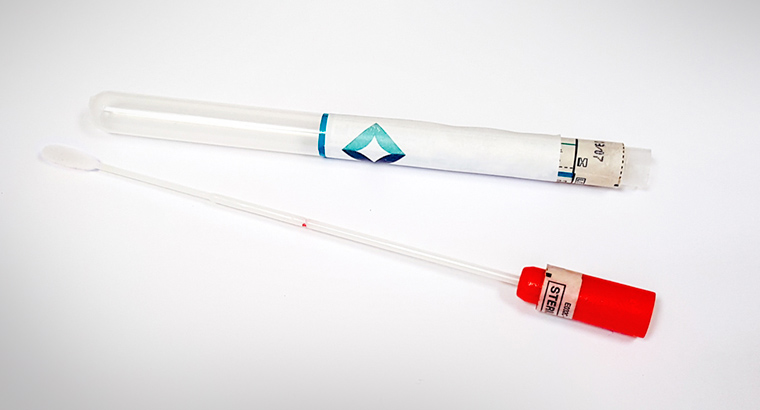Feature
Australia working with Malaysia on HPV self-test pilot program
Self-testing may hold the key to tackling cervical cancer deaths in Malaysia.
 Dr Lara Roeske demonstrating a new HPV self-testing approach in Malaysia.
Dr Lara Roeske demonstrating a new HPV self-testing approach in Malaysia.
Cervical cancer is the third most common cancer in the country of 31 million people – accounting for six deaths every day – despite now being preventable and effectively treated if detected early.
Human papillomavirus (HPV) vaccines prevent infection from many of the strains of HPV, which can cause cervical cancer, but some strains are not covered by the vaccine, meaning screening is still necessary.
One of the main issues is that many Malaysian women are reluctant to have a speculum examination, with only 25% of eligible women reported to have had a Pap test between 2013 and 2017.
Fear, embarrassment and discomfort are some of the common reasons Malaysian women are avoiding the test, and this reduced uptake means an increased risk of developing – and dying from – cervical cancer.
It is for that reason that the VCS Foundation in Australia has partnered with the University of Malaya to roll out a ground-breaking new pilot named ROSE (Removing Obstacles to Cervical Screening), allowing women to self-test for HPV at a clinic. This is coupled with the use of VCS Foundation’s secure eHealth platform canSCREEN, to receive results quickly by mobile and track each woman’s screening journey using the population health management platform.
‘This approach embodies safety, privacy and dignity through self-sampling, encouraging more women to willingly participate in screening,’ Professor Woo Yin Ling of the University of Malaya, who co-led the pilot program, said.
‘It’s the first time any country has rolled out a broad based anti-cervical cancer pilot program combining the three components of self-sampling, HPV testing and a secure population health management register.’
Dr Lara Roeske, Chair of RACGP Specific Interests and VCS Foundation’s Director of Education, told newsGP that ROSE would help Malaysia to respond to the World Health Organization’s (WHO) global call to eliminate cervical cancer, by strengthening the country’s cervical screening program.
‘There are significant barriers for many women to accessing cervical screening. In Australia, only six out of 10 women participated in screening at the recommended two-year interval under the previous guidelines,’ she said.
Dr Roeske said self-testing, which allows women to take their own sample, removes the need for a speculum examination, and now has results as good as a cervical screening test taken by a doctor. With many Australian women eligible for the HPV self-test, the GP has an important role in identifying these women, offering the HPV self-test and supporting appropriate follow-up.
‘Women can do the test quickly, safely, accurately and painlessly. It is evidence-based and as good as a practitioner-collected sample,’ she said.

The self-collection sampling swab.
The Malaysia pilot will this year expand from 4188 participants to 14,000. Dr Roeske is hopeful the pilot’s success will lead to a nationwide roll-out.
‘We know screening is still very important, as there are oncogenic HPV types that are not included in the currently available HPV vaccines used in Australia and Malaysia,’ she said. ‘If you have a screening test with major barriers to access, you’re not going to achieve the targets you set out to achieve.
‘Malaysian women weren’t taking up the Pap test. Now there is an alternative, which will hopefully grow to a national approach.’
From early in 2018, Australian women have had the option of self-collection if they refuse a speculum examination, are aged 30 years or older, have never screened or are at least two years overdue for screening.
‘We were the first country to include the self-collection pathway as part of our national guidelines,’ Dr Roeske said.
Associate Professor Marion Saville, VCS Foundation Executive Director and ROSE co-lead, said the pilot will encourage more women to willingly participate.
‘The HPV test is evidence-based and highly accurate, providing greater reassurance to women and their families. Access to this improved diagnostic accuracy will require significantly less frequent testing over a Malaysian woman’s lifetime while still affording high levels of protection against cervical cancer,’ she said.
Associate Professor Saville said the new approach will also work in Australia.
‘We know that many women in Australia also experience a range of barriers to having a Pap test as recommended and are therefore at higher risk of the disease,’ she said. ‘Evidence suggests that Australian and Malaysian women would generally find this new approach to screening much more acceptable.’
The use of canSCREEN would also be useful, as the population health management platform will allow health professionals to track the progress of every woman screened over their lifetimes.
‘This provides a welcome safety net to ensure that women in whom HPV is detected are followed up and managed appropriately,’ Associate Professor Saville said.
‘It also allows optimisation of health resources by preventing duplication of services while establishing a powerful resource to monitor Malaysia’s progress towards eliminating cervical cancer.’
cervical cancer cervical screening HPV self-collection
newsGP weekly poll
How often do patients ask you about weight-loss medications such as semaglutide or tirzepatide?